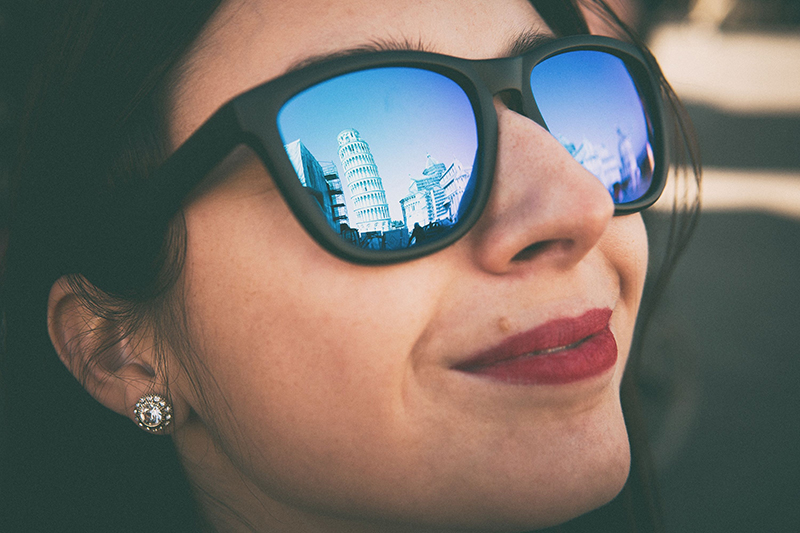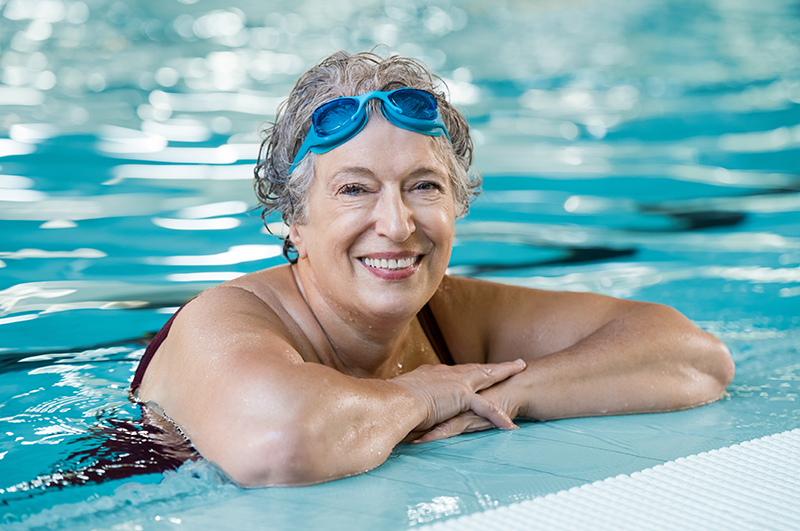Here are 5 ways to keep your eyes safe and healthy during the summer season:
1. Avoid eye sunburn
If you’re like a lot of people, sometimes you remember — and sometimes you forget — to slather on sunblock when you head out for some fun in the sun.
Maybe your parents drilled it into your head when you were a kid. Maybe you see people posting vacation selfies in which they’re red as a lobster, so you make a mental note to stop at the drugstore and grab some sunscreen next time you’re on your way to the beach.
And that’s good! At least you’re making an effort to protect your skin from the harmful effects of the sun. A tan is nice, sure. But skin cancer? No thanks.
Now, we humans haven’t always had CopperTone and Banana Boat, but it may come as a surprise to you that early civilizations around the world were using plant-based sunscreens on their skin for protection from the sun. Pastes made out of zinc oxide have been used for millennia, for example.
It wasn’t until the mid 20th century, though, that sunscreens developed by scientists and made for mass consumption really took off. Chemist Franz Greiter invented the SPF rating, which the U.S. Food and Drug Administration adopted in 1978, and dozens of companies met consumer demand by developing sunburn creams and sunscreen formulas — including water-resistant ones.
And much of that growth in public demand has been based on continued scientific discovery, as well as an increase in awareness of a major public health issue, skin cancer.
Nearly 10,000 people in the U.S. alone are diagnosed with skin cancer daily, and more than 2 people die because of skin cancer every hour.
So it’s a good thing that more people are learning about the necessity of sunscreen for their skin anytime they go outside.
But one thing a lot of people don’t know about harmful UVA/UVB rays is that their eyes are just as susceptible as their skin — which means you’ll often see people making a fuss to get high-SPF sunscreen while grabbing any old pair of sunglasses that look good for the beach.

Can your eyes really get sunburnt?
Yes. Also known as photokeratitis, sunburn of the eye is caused by prolonged exposure to the sun’s ultraviolet (UV) rays.
Remember that when it comes to sunglasses, function is more important than fashion. (But it’s totally possible to get sunglasses that successfully do both!)
Those beachgoers with decent sunscreen yet bad sunglasses might not know that UV rays reflecting off water and sand are just as harmful to eyes as skin. Corneas can easily become inflamed. Symptoms include redness, blurry vision and pain.
How do you prevent eye sunburn?
To protect your eyes, always wear sunglasses that block 100% UV rays when you’re outside — even on cloudy days — as well as a hat with a rim, and stay indoors when you can.
You can also keep your eyes moist with artificial tears to prevent dryness. Soothe swollen eyes with a cool, damp washcloth. Whatever you do, DON’T rub your eyes. That’ll just irritate them and prolong the symptoms.
If symptoms last longer than 24–48 hours, immediately contact your eye doctor.
2. Prevent swimmer’s eye
On a scorching summer day, taking a dip is the perfect way to cool down. It can also be pretty tough on the eyes if it’s not saltwater you’re swimming in.
“Saltwater is a more natural approach and safer on skin, hair and your eyes,” according to Arthur Kobayashi, OD. “Eye irritation will be greatly reduced by swimming in saltwater.”
But if you’re jumping into most pools, it’s chlorine you’re dealing with.
Cleaning chemicals like chlorine strip away the tear film, which protects your eyes. This makes them red, itchy and uncomfortable. Chlorine is designed to kill most bacteria in the pool, but whatever bacteria that survive the chlorine can cause an eye infection like pink eye. And if you swim a lot, you might develop dry eye and experience blurred vision.
How to protect your eyes when you swim
Summer swimming is all about having a good time in the water, so don’t let water getting in your eyes ruin the fun.
Try any of these 4 tips to keep your eyes protected in the water:
- Wear swim goggles to keep water and pool chemicals out of your eyes
- Wash your closed eyes with fresh water after swimming
- Use over-the-counter lubricating eye drops before and after swimming to maintain a healthy tear film
- Drink lots of water throughout the day to keep your body hydrated and your eyes moist
And please don’t pee in the pool. “Pee mixed with chlorine creates chemicals that can make your eyes red and itchy,” according to the Centers for Disease Control and Prevention.
You can also check with your ophthalmologist to learn more about prescription eye drops.

3. Fend off dry eye
It’s a story we hear time and time again. All throughout fall, winter and spring, someone longs for summer. But when summer comes around, dry eye makes it next to impossible to fully enjoy outdoor activities. Then we’re asked how to prevent dry eye… or at least how to make it manageable.
Spending time outside during the summer months is a fantastic way to lead a healthy, active lifestyle, but heat, wind and dryness make for a bad combination — and make you think twice about chancing another summer adventure anytime soon.
Does this sound familiar to you? You’re probably stopping frequently to put in eye drops or rub your itchy eyes, which really puts a damper on enjoying good weather.
And you’re not the only one. Researchers reported last year that the prevalence of dry eye ranges from 5% to 50% of the world population.
How to deal with dry eye symptoms
Dry eye syndrome happens when your tear film dries out and leaves your eyes’ surfaces vulnerable to direct and indirect exposure to sunlight’s UV rays and outside elements.
Symptoms of dry eye (usually affecting both your eyes at the same time) include:
- Blurred vision
- Mucus in the eyes
- Stinging or burning in the eyes
- Light sensitivity
- Red eyes
- Watery eyes (your body’s natural response to dryness)
To keep your peepers safe, you should wear sunglasses when outside, preferably wrap-around ones. You can also use preservative-free lubricating artificial tears to refresh the moisture on the surface of your eyes.
If your symptoms are prolonged, you should talk to your eye doctor as soon as possible.
Note that normal tear production depends on a lot of factors, including your age and whether you have certain medical conditions like diabetes. If you’re unsure about whether your tear production is adequate, schedule a visit with your doctor, who can help you find out.
Dry eye doesn’t just occur outside and in the summer. It can happen to you at work in the office year-round, too.
Enjoying this article?
Get more like this sent to your inbox!
4. Take eye safety seriously
Summer is all about the outdoors. Tossing a ball, mowing the lawn, you name it. But many of us simply forget to use protective eyewear — or to avoid dangerous activities.
Let’s take fireworks, for example. The Fourth of July is notoriously known as the most dangerous holiday in the U.S. That’s because it doesn’t matter whether it’s legal or illegal in your state. Playing with fireworks is inherently dangerous. Most fireworks-related injuries are to the hands and the eyes.
But you don’t have to wait until Independence Day to be responsible when it comes to eye safety!
When nearly half of all eye injuries happen in and around the home, don’t you think it’s a good idea to play it safe every single day?

Eye injury risks in and around your home
Whether it’s you or a family member nearby, always be careful during activities like the ones mentioned below. And wear protective eyewear if it’s a task you can’t simply avoid — it’ll prevent 90% of any potential eye injuries!
- Using hazardous cleaning chemicals and products
- Cooking foods with hot grease or oil
- Popping open a champagne bottle
- Hammering or drilling on hard surfaces
- Loose railings or rugs that could cause slipping and falling
- Mowing the lawn
- Using a power trimmer
- Clipping hedges
- Using power tools
- Working with anything that produces fragments or particles
No matter what you’re doing around the house, take eye safety seriously. Wearing sunglasses, sports goggles and swim goggles are all great ways to protect you and your family’s vision while you’re out having summer fun.
5. Stop smoking
Improve your eye health this summer by quitting this bad habit. Cigarette smoke (including second-hand smoke) is a risk factor for plenty of eye diseases and major health problems, including macular degeneration, cataracts, dry eye and more.
Easier said than done. I understand.
As the saying goes, “The chains of habit are too light to be felt until they are too heavy to be broken.”
But it’s not impossible.
And you don’t have to wait until New Year’s Day to make a positive life change like quitting smoking.
How long does it take to change a habit? It depends on who you’re asking.
Some say 18. Some say 21. Some say 28. Others say it’s much more. But it’s important to understand it’s not the same for everyone. The important thing is to start and to stick with it as best as you can.
Psychology Today provides 10 steps to help you overcome bad habits.
Protect your eyes this summer.
Let’s face it: No matter how you choose to enjoy your summer, you’ve got to remember to protect your eyes!
- Wear sunglasses to avoid eye sunburn.
- Avoid swimmer’s eye by being careful what water you swim in.
- Reduce dry eye by wearing protective eyewear outside.
- Remember eye safety in and around your home.
- Get rid of the unhealthy habit of smoking.
Apply these 5 tips as you have fun in the sun, and share them with your friends on Facebook.
If you have any questions about protecting your eyes in the summer, feel free to get in touch with us here at Perrysburg Eye Center. We’re here to help you keep your eyes in tiptop shape.
